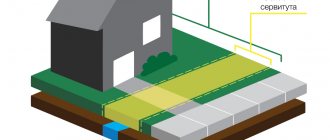According to the Housing Code of the Russian Federation, a residential private house is understood as a separate building containing residential rooms and non-residential (domestic) premises. In general, the house must satisfy housing and construction standards, then the Housing Inspectorate issues permission to use the premises for permanent residence.
Private houses can be located within the boundaries of a populated area or outside it, which makes it possible to classify them as dachas. Like privatized apartments, houses can have one owner or several. The house can become the property of the co-owners by inheritance, after registration of the sale or purchase or deed of gift.
Dear readers! The article talks about typical ways to resolve legal issues, but each case is individual. If you want to find out how to solve your particular problem , contact a consultant:
8 (800) 700 95 53
APPLICATIONS AND CALLS ARE ACCEPTED 24/7 and 7 days a week.
It's fast and FREE !
To transfer property for free possession to another person - a close or distant relative, an outsider, it is necessary to draw up a donation agreement for a part of the house. Most often, along with the house, the owner formalizes a donation of the land on which the house is located; these two pieces of real estate are considered indivisible by law.
Thus, you cannot give part of a house to one person and land to another. To formalize a deed of gift, the desire of the owner alone is not enough; the donee must agree to accept the gift and sign a document on the basis of which the rights to own the property will be re-registered to the new owner.
In order for the owner to give a part of the house to another person, he himself must be the full owner of the entire building, its part or share. A gratuitous transaction, which includes a deed of gift, is understood as a unilateral transfer of property when, in response to the donor’s gift, the recipient does not owe him anything.
It is possible to draw up an agreement with certain conditions; the donor independently decides whether the property will pass into the hands of the donee immediately after the transaction is completed or after the occurrence of a certain event, with the exception of his death.
A significant difference between a deed of gift for a part of the property is a specific indication of its name, location, characteristics and other parameters. A piece of real estate received as a gift is legally indivisible, that is, it cannot belong to anyone other than the recipient.
If part of the house is gifted to one of the spouses, then even after the divorce process it cannot be divided as jointly acquired property.
Property donated is considered income for the donee, therefore he is obliged to pay tax to the state based on its value, and gift agreements between close relatives are not taxed
Main concepts
In 32 ch. Of the Civil Code, the legislator regulates the donation procedure, but at the same time he does not indicate exactly how to go about it for both parties to the transaction. The only indication is that after registration of the deed of gift, state registration of property rights is necessary. These rules have not changed since the release of regulations governing real estate issues, which is important for citizens who plan to complete a transaction in 2020.
Citizens should also remember that after the transaction is completed, when the new owner receives a registration certificate, it will be very difficult to terminate the contract, although the legislator reserves this right for the donor, his relatives and the donee. Moreover, termination without mutual consent of the parties occurs only in court after providing compelling reasons that are specified in regulations. Sometimes a court may declare a transaction void or invalid if it turns out that it was carried out in violation of the law.
Chapter 32 - Giving
A special feature of the deed of gift is also the fact that the gift, in this case part of a private house (dacha), must be transferred to the donee during the life of the donor. If after execution of the document the donor died suddenly and the recipient did not have time to undergo state registration, then the transaction is considered void.
In another case, it will not take place if the donee first signs the deed of gift, and then changes his mind about accepting the gift and writes a refusal. In any case where property is required to be returned to the original owner, it must be returned to the donee in the same condition in which he received it.
Step-by-step instructions for donating a share of a house with a share of land
First, decide which specific part of the house you plan to donate. Pay attention to how the future owner will dispose of the part donated to him. Keep in mind that his living, just like yours, as a shared owner, should be as comfortable as possible. Next, do the following:
- Invite a specialist - a technician from their BTI to carry out an inventory of the living space and compare the existing plan with the real state of affairs;
- If unaccounted areas or unauthorized changes are discovered, bring them into proper form;
- Receive a certificate from the BTI about the results of the inventory;
- Collect documents defining the ownership of the house and a certificate of ownership;
- Attach cadastral passports of the house and land plot to them; they should not be received earlier than 5 years. If your passports are expired, get new ones;
- With civil passports, go together with the recipient to a notary office to draw up a deed of gift. Alternatively, seek legal advice from a competent specialist;
- Draw up a gift agreement in accordance with the stipulated rules;
- Have it notarized;
- Pay the costs for drawing up and certifying the contract;
- Contact your local cadastre and cartography office to register the deed of gift;
- On the appointed day, receive certificates of ownership that have been registered.
If you feel confident that you can draw up a legally correct gift agreement yourself, you have the right to do so. If it is not drawn up properly, the notary will not register it, but will offer to compile it according to a standard template.
Basically, you have nothing to lose.
But keep in mind that in the case of a notarized but not properly executed agreement, unforeseen difficulties may arise.
Sample agreement for donation of a share of land and a share of a house.
Design details
When drawing up donation agreements for part or all of the property, the legislator establishes a certain list of persons who may or may not be parties, for example:
- The donor must be aware of what he is doing, that is, be of sound mind, be mentally healthy. Sometimes a notary may require a medical examination of the donor.
- The donor can be an individual or a commercial organization, but only citizens are allowed to act as recipients.
- The recipients cannot be doctors, educators or civil servants if the donor is an outsider who is their patient, ward, or subordinate. In fact, in this case, the legislator indicates that the presentation of a gift should not be a thank you for work performed. For example, if a doctor saved the life of a patient, the recovered person cannot gift him with movable or immovable property.
- Only legally capable donors can take part in the transaction. Incapacitated persons include minors under 14 years and minor children 14–18 years of age . Only their legal representatives can accept a gift for them.
- Other situations provided for by law.
To draw up a gift agreement, it is necessary to collect documents from the donor and the recipient. It is best to carry out the transaction through a notary, although it is also possible without his participation. Both the donor and the donee are allowed to take part in the transaction by a trusted person, but a power of attorney must be issued to him.
After the contract is signed, it is necessary to submit a package of documents for state registration of ownership rights to part of the house by the new owner. The donor and the donee must transfer the documents together; if one of the parties is a minor, then the presence of his legal representatives is mandatory.
When registering property rights to the new owner, you will need to pay a state fee.
Share of the house and plot - as interpreted by the law
The concept of “share” in relation to real estate does not exist in modern current civil and housing legislation. However, the Civil Code covers in sufficient detail the issue related to the existence of shared ownership. At the same time, there is no difference in what kind of shared ownership it is in the provisions of this law. For this reason, we can say that the shares of either a house or a plot should be understood as its part allocated in kind (for example, by creating a separate entrance to the house or erecting a fence on the plot) or in monetary equivalent in proportion to the total value of such real estate.
The definition of shared ownership in general terms is contained in paragraph 2 of Article 244 of the Civil Code of the Russian Federation.
Based on this norm, we can say that the share of a house or plot is understood as such a part of the property that was formed by drawing up an appropriate agreement, including through the donation of parts of such property.
What does a contract for donating a part of a house consist of?
The donation agreement, which is drawn up in writing, states:
- information about the parties involved in the transaction based on passport data or birth certificate (for minors);
- data of the legal representatives of the minor, as well as documents that can confirm their status;
- the subject of the contract, it is a part of the house with a specific description of the premises, their sizes and various characteristics;
- as a separate line, the plot under the house with the necessary characteristics, if it is also the object of a donation;
- the rights and obligations of the donor and the donee, there may be conditions under which property rights must pass to the new owner; in their absence, the contract is considered to come into force instantly;
- the procedure for transferring part of the house, the phrase must be indicated that the deed of gift is endowed with the legal force of an act of acceptance and transfer of property; if it is missing, then it is assumed that a separate document will be drawn up;
- liability of the parties;
- procedure and grounds for termination of the contract;
- various conditions: dispute resolution, force majeure, etc.;
- place of the transaction;
- date of drawing up the contract;
- signatures of the parties.
When transferring a house without a plot or with land, it is necessary to indicate exactly what is being transferred into the possession of the donee. It is also important to indicate what the owner is transferring - a separate share to which he has rights, or a part of the house where he has equal rights and obligations with the other owners.
All data in the contract is entered from documents presented by both parties, the main ones include:
- passports, birth certificates;
- cadastral and technical passport for real estate;
- property documents.
Before going to the notary, it is recommended to prepare a draft gift agreement. Its standard sample can be downloaded on the Internet, but it is best to prepare a version of the contract together with a qualified lawyer, this will help to avoid possible negative consequences in the future.
It will be important to include in the contract information that:
- the donor and recipient are of sound mind and capable;
- the transferred property is not the subject of disputes, is not officially promised to other persons, is not pledged, etc.;
- a deed of gift is an ordinary agreement between the parties or a consensual contract, when the donor binds himself with a promise to present a gift in the future;
- there are persons whose rights may be infringed by the execution of this agreement;
- in the part of the house that is transferred to the donee, such and such citizens are registered (not always required);
- another.
Form of share donation agreement
A donation accompanied by the transfer of a gift to the donee may be made orally, except in the following cases:
- The agreement for donating a share must be made in writing in cases where: a) the donor is a legal entity and the value of the gift exceeds three thousand rubles; b) the contract contains a promise of a gift in the future.
- The share donation agreement is subject to state registration.
The rule on state registration of transactions with real estate, contained in Article 574 of the Civil Code of the Russian Federation, is not subject to application to contracts concluded after March 1, 2013 (Federal “law” dated December 30, 2012 N 302-FZ).
The transfer of a share of the house is carried out through its delivery, symbolic transfer (handing over keys, etc.) or delivery of title documents.
Sample agreement for the donation of a share of a house owned by the donor on the right of common shared ownership
To whom and how to transfer
Transfer of property on the basis of a deed of gift can be made to complete strangers. Only in some cases described above, the donor cannot do this. Although in fact, donation occurs most often between persons who are related, and close ones at that.
One of the categories of donees includes minor children under 18 years of age . The procedure for donating to them has its own characteristics.
Child
A donation can be made in favor of a minor, but his legal representatives must give written consent to the transaction if the child is under 14 years of age . Upon reaching the age of 14, he can independently agree to accept the gift.
The preparation of documents for concluding an agreement, the registration procedure with a notary and the subsequent registration of property rights to a minor can only be carried out by legal representatives (parents, guardians, adoptive parents, representatives of institutions where the child is being raised).
When a child turns 14 years old , he is allowed to sign the gift agreement on his own, but it must also contain the signatures of legal representatives. When submitting documents for registration of property rights in Rosreestr, a child who has reached the age of 14 can also independently write a statement that he does not object to receiving the gift.
Giving a share of an apartment to a minor child is becoming an increasingly popular procedure today. Is it possible to terminate a gift agreement? Find out in this publication.
For minors, such an application is completed by legal representatives. According to the law, the child receives ownership rights to part of the house, but in fact, until he comes of age, his legal representative will manage the property, except for sale, gift, exchange and other transactions.
If both parents are present at the transaction, then the permission of the guardianship authority is not needed to draw up a deed of gift; otherwise, its consent is required. When one of the parents wants to transfer his share to the child, he is not obliged to inform the other about this.
One of the parents can take permission from the guardianship authority and invite a civil servant to be present at the conclusion of the deed of gift. In this case, the parent is the donor, and the receiving party on behalf of the donee is an employee of the guardianship authority. In this case, the transaction can be completed without the presence of the second parent.
A deed of gift for a child is drawn up in the same way as any deed of gift, except that information is entered about the donee, who is a minor, and his legal representatives present at the transaction.
It is deeds of gift for children that are most often drawn up with the conditions that the property will not be transferred to them easily when they turn 18 years old, but:
- after graduating from a higher educational institution;
- marriage;
- and others.
It is necessary to take into account that a minor can be a donee, but a donor only after reaching the age of majority.
Relatives
A donation in favor of the donee, from a legal point of view, is an alienation of property. Regardless of who the donor is, the form of the agreement and the procedure for the transaction do not differ. The difference between a transaction between close relatives and one conducted between strangers occurs at the stage of paying income tax.
For the donee, income is the property received, but only transactions between strangers are subject to taxation. Moreover, distant relatives of the donor are classified as strangers in this case.
The legislator considers the following to be close:
- children;
- parents;
- spouses;
- grandchildren;
- grandparents;
- brothers and sisters.
For the donor, the most convenient option is a situation where a close relative is already a co-owner of one part of the house. When the contract is drawn up, the second one will simply pass to him and he will become the full owner of the entire building.
There are often situations when, in order to avoid paying taxes to the state, relatives draw up several deeds of gift. For example, it is impossible to give a part of a house to a nephew without taxation, so the aunt should draw up a deed of gift in the name of her brother, the nephew’s father. Then the father will be able to issue a deed of gift for his son. In both cases, you do not need to pay income tax.
Application and rules for its execution
You can download a sample application from the link.
A sample of this document can be obtained both in multifunctional centers and in territorial divisions of Rosreestr, where the direct registration of the completed transaction will take place.
This document must include the following sections:
- Name of the registration authority where the application will take place;
- Information about the applicant as a party to the transaction, including passport details of such persons.
In addition, if the deed of gift is made in relation to minors who have not yet turned fourteen, the information about the applicant will have to indicate information about their representative.
If we are talking about representation of interests by proxy, then information about the proxy and the document on the basis of which he acts.
Directly the data itself about the registered transaction, including information about the transferred property (date, place of the transaction,
subject, that is, a description of the property transferred under a donation agreement in the form of a part of a house and a plot, indicating the area, cadastral and technical data, location address);
A list of attachments accompanying the application and the registered gift agreement (since the registration of the transaction is carried out together with a similar action regarding the existing property right, all attached documents must be submitted in originals, since some of them, for example, confirming the ownership of the subject of the transaction of the donor, will be confiscated).
From the moment of submitting the application along with the attached documents until the recipient is issued an extract from the Unified State Register confirming his ownership of the gift received, no more than ten days should pass. In exchange for all submitted documents, applicants are given a certificate listing what they submitted.
Things to consider
When drawing up a contract, both parties must take into account that:
- donating a part of a house with a plot has its own characteristics;
- the share can be donated subject to certain conditions;
- The income tax rate differs for different categories of citizens.
Land plot
The land is the same real estate as the building erected on it. It can be sold, donated, bequeathed. The only condition is registered rights to it. It often happens that the land belongs to a cooperative or an enterprise that has allocated plots for development to employees, and the houses that were built there are registered to the owners.
In another case, the owner of the house received land from the state many years ago, and has not yet formalized the privatization, but he built the house. Thus, the owner will not be able to make a deed of gift for the house and the plot at the same time.
In this case, the citizen will first have to receive the land for free use from the official owner, although in fact he has been managing it for a long time. If the house belongs to several owners, then it is logical to divide the plot of land under it between them. The donor should allocate his share of the land, register ownership rights to it, register it with the cadastral register, and only then donate it along with part of the house.
The land and the house on it are integral parts of each other; by law they must belong to the same person. The donated land plot, like the house, is the indivisible property of the new owner, and cannot be divided even in the event of a divorce.
In the deed of gift, part of the house and the land under it are described separately. It is necessary to indicate the exact location, dimensions, boundaries, cadastral number, category and others. Also, when drawing up a contract, you should attach documents for the land: property rights and cadastral passport, consent of the co-owners.
As with the building, information about the plot is entered that it does not have an encumbrance, is not pledged, etc., and after the deed of gift is issued, the new owner will have to separately register the ownership rights to the house and plot
Share
If desired, the donor can draw up a deed of gift for a share, and not for the entire house, which is important when the recipient is a son or daughter. When transferring a share, the permission of other owners, if any, is not required. When a part of a house is donated, the co-owners must give permission to formalize the deed of gift.
The contract for a part of the house should indicate what it includes, for example:
- number of living rooms and utility rooms;
- area of each room;
- on what floor the premises are located;
- another.
If we are talking about a share, then first it should be isolated from the general structure, and then only rewritten. In a private house, it is allowed to allocate a share if the owner or co-owners come to an agreement, remodel and equip a second entrance. A separate part of the house must also be equipped with communications for supplying gas, water, and electricity.
The room inside should have living rooms, a bathroom, and a kitchen. The division of the house can only be carried out after a technical examination. When the share is allocated and the documents for it are drawn up, then it can be donated.
If the owner of a private house, for example, is one citizen, and he decides to give a share to his son, then first he makes a division of the house, where both shares will belong to him, and then he transfers one of them to his son. A deed of gift for a share is no different from an agreement drawn up for a part. It will have to clearly describe the premises being transferred and what is included in it.
Taxes
Only gift agreements between strangers, which also include distant relatives, are subject to taxation. The donee is required to pay income tax; if he is a minor, then his legal representatives do this for him.
Citizens who are:
- residents pay 13% of the value of the property received;
- non-residents – 30%.
To calculate the tax amount, the market value of part of the house is accepted; it can be indicated by the donor in the contract. But for the tax office this figure will only be approximate; they will definitely check it. After receiving the property and registering ownership rights, the new owner next year, before April 1, is required to submit a declaration calculating the amount of tax.
He pays it until July 15 of the year following the reporting year in which the income was received. If a plot of land was donated along with the house, then the tax amount will have to be calculated based on the total cost.
What steps should you take to make a gift?
In order for the deed of gift to be fully legal in nature, it must be carefully prepared.
All preparation for the final registration of the newly emerged ownership of the house and land plot in the form of their parts will consist of five main steps:
- Preparation of all documents on the part of the donor confirming his right to make such a gift;
- Creation of a set of documents that provide technical characteristics of the donated object;
- Creation of a draft gift agreement and its approval between the parties to the transaction with the participation of a notary in such approval;
- Signing the contract and notarizing it;
- Registration of the acquired property right by contacting the registration chamber (territorial divisions of Rosreestr).
If we are talking about close relatives, contacting a notary will be required only if the gift is made with the imposition of any encumbrances on it.
What will be included in the contract
Regardless of in respect of whom the gift is made (a close relative or an outsider), the gift agreement ( https://yadi.sk/i/2hzCB6j13LYm6w - sample agreement ) will consist of sections standard for this type of transaction:
- Place and summer of imprisonment;
- Preamble indicating the parties to the agreement, representatives and the documents on the basis of which they act;
- Subject of the agreement (cadastral and technical data for the house and plot are indicated with a breakdown of those shares that are being donated);
- Rights and obligations of the parties involved in the transaction;
- Possible encumbrances on the transferred property (if such encumbrances were imposed during the operation of the house and land, since no other restrictions under the gift agreement can be imposed on the property);
- Actions of the parties in force majeure circumstances;
- Final and transitional provisions (including an abbreviated indication of the parties’ details - in the presence of possible financial encumbrances regarding the donated property);
- A list of attachments accompanying the agreement, including the act of acceptance and transfer of the gift signed by both parties.
If no encumbrances are imposed on the property, this section is completely excluded.
Features of registration of deed of gift
The requirements for drawing up a gift agreement do not depend on to whom the donor’s property is transferred as a gift. Its design and content must not contradict the law.
In a general sense, such an agreement means a documented desire of a citizen to donate his property to the person named in the document. Its difference is the gratuitous transfer of the object of donation, i.e. in return for it, the donor should not demand anything from the recipient of the gift.
An agreement can be drawn up:
- in any form in writing without involving a notary;
- using the services of a notary and his confirmation of the transaction.
In any embodiment, the document must contain information about the parties to the gift transaction, indicating their last name, first name and patronymic, as well as detailed information about the transferred object itself.
If real estate is donated, it will fully belong to the recipient only after the object is re-registered as his property. The new owner, by law, must pay a tax established by the state, amounting to 13% of the value of the transferred property and a fee of 2 thousand rubles.
What is a deed of gift in 2020
From the point of view of the current legislation of the Russian Federation, a gift agreement or a deed of gift for a house is an agreement on the transfer (alienation) of real estate from one party to another free of charge, that is, without any benefit (money, things, services) for the donor of the property.
ASKING A LAWYER IS FASTER THAN READING! GET A FREE CONSULTATION WHILE OTHERS PAY FOR IT!
Today, the wide popularity of this method of transferring property is due to the short period of registration of ownership rights and financial savings. However, in order for the gift agreement not to be ultimately declared invalid, it is necessary to follow certain rules, having information about the “pitfalls” when concluding such a transaction.
For example, the grounds for canceling a deed of gift may include the completion of the transaction in question without the mutual consent of the parties or the presence of any conditions that imply that the current owner of the house receives a certain benefit after the execution of the contract.
Also, as we already mentioned in the article about donating a garage, real estate objects are directly related to the land plots on which they were built. Thus, the deed of gift will be considered invalid if the house is donated without ownership of the land. In this case, the plot of land on which the building (in this case, a house) is built is also subject to re-registration.
From the above we can conclude that:
- Registration of a deed of gift for a house is impossible without transferring into the ownership of the recipient not only the building, but also the plot.
- In some situations, a transaction is concluded with one contract for two objects at once.
For example, even when donating part of a house, the donor is obliged to transfer to the donee a certain part of the land, the size of which is calculated based on the general data of the building and the share.
Let us note that if the donor has a long-term lease on the property and, according to the law, he has the right to use it, he can transfer his right in full to the donee. At the same time, the former owner will continue to act as the owner.
Before drawing up a donation agreement for a house, you should definitely familiarize yourself with the established procedure for this simple but very important procedure.
- At the first initial stage, the donee must prepare all the necessary documents that confirm his right of ownership of the housing and the land plot on which it is located.
- After this, it is necessary to draw up an agreement, conclude a transaction (sign a deed of gift), and then be sure to officially register the act of transfer of ownership from the donor to the donee.
We invite you to familiarize yourself with Conversion in Marketing
Remember that in this case, only a transaction formalized in writing, but not orally, will be considered legal. The agreement must be drawn up in 3 copies, and it must clearly state the object of the donation and its detailed characteristics (technical data, location, cadastral value, etc.). In addition, the document should indicate the conditions and actual period when the deed of gift comes into force.
It is worth noting that, although, according to the current legislation of the Russian Federation, in 2020 the act of donation may not be certified by a notary, experienced lawyers of the Legal Ambulance website recommend involving a specialist in the procedure. Otherwise, there is a possibility that in the future one of the donor’s heirs will try to cancel the deal.
After the parties have signed the deed of gift, the procedure for registering ownership takes place according to one of the following methods:
- The parties submit the package of necessary documents to the local branch of Rosreestr.
- Papers are sent there by registered mail.
- All files necessary for registration can also be uploaded to the personal account on the official website of Rosreestr.
Let us immediately note the fact that the procedure for registering and drawing up a deed of gift for a house between close relatives must take place in accordance with the scheme established by law, subject to the requirements of the Civil Code of the Russian Federation. However, in some cases, the content of the gift agreement in this case may differ from the standard one.
Remember that an indication in the content of the agreement that the deed of gift will come into force only after the death of the donor and the current owner of the donated property leads to the recognition of the transaction as invalid! Such a document will 99.9% be challenged by a court decision.
It is also worth noting the fact that drawing up a donation agreement for a house, like most legal procedures, involves certain financial expenses. At the same time, having transferred all expenses to the donee, the donor may not pay anything at all, because, in fact, he does not receive any benefits as a result of the transaction.
The total cost of the costs of correctly registering a deed of gift directly depends on the methods of its execution and the individual characteristics of the transaction.
Thus, in the case of independently drawing up an act, the parties to the contract who are included in the category of relatives will only pay a fee established by the state. The price for registration of a deed of gift by an agency will vary, depending on the region of residence of the parties and the complexity of the situation. However, we remind you that each of our visitors has the opportunity to get a free consultation, which will allow you to save a lot!
Since during the transaction only the recipient party benefits, it is he who will have to pay for the procedure for registering property rights. Today the price for this is set at 1,000 Russian rubles. Remember that without a corresponding receipt for successful payment for this service, employees of the registration authority do not have the right to carry out the operation of transferring ownership of the donated house.
Deed of gift for a share of a house: pros and cons
Before drawing up a deed of gift, it is advisable to weigh the pros and cons. Let's look at the pros and cons of this approach.
Among the positive aspects of the transaction are :
- the deed of gift is drawn up according to the classic model , and the transaction is concluded within 15-30 working days;
- lack of notarization of documents ;
- no need to collect an extensive folder with documents , it is enough to confirm ownership and correctly draw up a contract;
- a deed of gift allows you to bypass some restrictions on the transfer of real estate;
- the agreement comes into force during the life of the donor - there is no need to wait the required 6 months, as is the case with an inheritance.
Along with its advantages , a deed of gift for a house also has its disadvantages . They are expressed as follows:
- A deed of gift in the name of a distant relative or third party is subject to state duty and income tax. The tax amount is calculated based on the value of the house and land. As a rule, in the end, an impressive amount accumulates, which only discourages making gift transactions.
- A gift agreement is easily challenged in court. Today there is a whole list of cases when a transaction is recognized as void or imaginary. A successful challenge to the transaction will invalidate the previously concluded gift agreement, and in some cases the property may go to the state.
- Compared to the powers of the testator, the donor cannot change the terms of the transaction or even cancel it.
- At the time of the transaction and after the deed of gift is executed , the donor loses the right to the property and cannot impose any obligations on the recipient.
Thus, the gift agreement has both pros and cons . Unlike a will, a transaction is beneficial to the recipient and not always beneficial to the donor.
What is a share (part) of a residential building
Art. 128 of the Civil Code of the Russian Federation provides for objects of civil rights with which certain transactions, including donations, can be made. However, among them the law does not distinguish such a concept as “share”. However, in practice it is quite often possible to see that in real estate transactions, i.e. property that is inextricably linked with land (Article 130 of the Civil Code of the Russian Federation), alienation of shares of this property occurs. This also applies to residential buildings. Such houses in accordance with Art. 15 -16 of the Housing Code of the Russian Federation (LC RF) relate to real estate and the category of housing stock.
Taking into account the above, we will try to determine what is meant by the share of a residential building. According to the provisions of Chapter 16 of the Civil Code of the Russian Federation, the definition of shares relates to the institution of property , in particular Art. 244 of the Civil Code of the Russian Federation identifies the concept of shared ownership , when property is in common ownership of several persons, but with the definition of shares.
In this case, does not matter , since such a share, in relation to a residential building, is a share in the ownership right. Those. Regardless of the size of the share, each of the owners of the property has the right to it, or, in other words, can own it and use it at their own discretion (Article 209 of the Civil Code of the Russian Federation). When determining the size of shares in such a house, it is necessary to be guided by the provisions of Art. 245 of the Civil Code of the Russian Federation, which establishes that unless the owners provide otherwise in the agreement, then their shares are considered equal.
There are three people in the Ivanov family who have the right of shared ownership of a residential building consisting of 2 rooms with a total area of 50 square meters. m. In accordance with paragraph 1 of Art. 245 of the Civil Code of the Russian Federation, their shares are considered equal. Moreover, the size of these shares is 1/3 for each owner, but at the same time, each of them can use both rooms of the house and any number of square meters. m.
With shared ownership, there are some restrictions on the disposal of property. They are expressly stated in Art. 246 Civil Code of the Russian Federation:
- it is possible only by agreement with all property owners;
- observance of the pre-emptive right to purchase when alienating property, except in cases of donation.
Stages of contract execution
What is important is the execution of the contract itself. But if the donor simply prepares the document and puts it in a box, then nothing will happen. The deed of gift must be presented to re-register the owner with Rosreestr. Therefore, having decided to give his son his property, the parent must do the following:
- prepare a gift agreement for your son;
- present it to the registration authority of Rosreestr. You can do this through the MFC or contact them in person;
- pay a fee;
- obtain an extract from the register for the new owner of the parental property.
When registering a deed of gift through a multifunctional center, the parties must sign the agreement directly in the presence of the registering person and pay the state fee. The son's signature is required only if he is 14 years old.
The procedure for the donation procedure and legal requirements for the transaction
In order to dispose of, including alienate land and house free of charge, the donor must have a formalized right of ownership of the plot. Both objects must be registered in the cadastral register. Information about the owner must be included in the register of rights. If the donor is not the owner of the objects, but uses them on the basis of another right, he must first be given the opportunity to dispose of the land and house.
If both objects are registered in the cadastral register, and the donor is their owner or owner of a share, a transaction for gratuitous alienation can be carried out. The transfer of ownership from one person to another is carried out in two stages: the participants agree on the conditions and enter into an agreement, then the transaction is registered in Rosreestr.
The parties have the right to independently draw up a deed of gift if minors are not involved in the transaction and the property is in sole or joint ownership. In other cases, it is necessary to contact a notary, who will help draw up an agreement and ensure that the rights and interests of the participants are respected, and that the process of transferring ownership takes place without violating the law.
If the parties independently draw up a deed of gift, they must indicate the following in the text of the document:
- Information about the parties. It is necessary to indicate the full name, date and place of birth of the participants, registration address, and passport details. The donor and recipient should ensure that identification documents are valid and not expired. Otherwise, the registrar will refuse the procedure for entering information into the register.
- Characteristics of the site and the house. The address, cadastral numbers of objects, area and other data should be reflected. It is also necessary to indicate the shares transferred under the transaction in square meters.
- Data of title documents for real estate objects. These are the papers by which the donor received his ownership rights, for example, a purchase and sale agreement or a privatization certificate.
- The fact of gratuitous transfer of shares of the plot and home ownership. It should be noted that the donor undertakes to transfer the items of the transaction, and the recipient undertakes to accept them.
- Rights and obligations of the parties and the procedure for unilateral termination of the contract. Thus, it must be indicated that the donor has the right to cancel the transaction in the event that he outlives the recipient, if this is important. Otherwise, it will be impossible to cancel the donation for this reason even in court.
- Clause about the absence of encumbrances on the property. It is worth noting that the recipient, by accepting shares of real estate, also receives all obligations that relate to these objects. Therefore, the donor is obliged to provide full information about the plot and house before concluding the transaction. Otherwise, it may be declared invalid, since the recipient was misled.
- Cost of real estate shares.
- Date and signatures of the parties.
The parties have the right to seek assistance in drafting the document from a qualified lawyer. If the deed of gift is drawn up by a notary, the participants must check the agreement before signing. Offices usually have a template that is adapted for each specific case.
Documents for deed of gift for a house
Many questions arise regarding how many documents are needed to register a deed of gift. The full list is presented:
- passport;
- certificate of ownership of the donated house and land;
- receipt of payment of state duty;
- statements from the parties to the transaction;
- a gift agreement indicating the main provisions of the transaction;
- cadastral passport for the house (from the BTI);
- a certified plan of the land plot (from the land cadastre);
- an extract from the house register;
- conclusion of an independent land appraiser ( notary );
- documents confirming the fact of relationship between the donor and the recipient (if the participants are relatives ).
If one of the participants in the transaction is a minor, the child’s legal representative participates in the gift agreement. After receiving a certificate of ownership, the minor can dispose of the property at his own discretion.
Author of the article: Petr Romanovsky, lawyer Work experience 15 years, specialization - housing disputes, family, inheritance, land, criminal cases.
Useful information on inheritance disputes
- Gift deed or will - which is better?
- Deed of gift with the right of lifelong residence
- Cancellation of deed of gift
- Challenging the deed of gift
- Gift agreement between close relatives
- Cost of deed of gift
- Documents for deed of gift
- Registration of a gift agreement
- Deed of gift with deferred rights of entry into property
- Registration of a gift agreement
- The difference between a will and a deed of gift
- Agreement for the determination and donation of shares
- Gift tax
- Invalidity of the gift agreement
- Donation of funds between individuals
- Is it possible to issue a deed of gift for a minor child?
- Agreement of gift or sale
- Share gift agreement between individuals
- Gift deed for an apartment
- Certification of the gift agreement by a notary
- Gift deed after the death of the donor
- Gift deed for garage
- Gift between spouses
- House donation agreement
- Deed of gift for a plot of land between close relatives
- Registration of real estate donation agreement
- How to draw up a deed of gift for a share in an apartment
- Transfer deed to the apartment donation agreement
- Gift agreement: pros and cons
- Gift deed for a relative's car
- Husband's consent to donate an apartment
- Is it possible to terminate a gift agreement?








